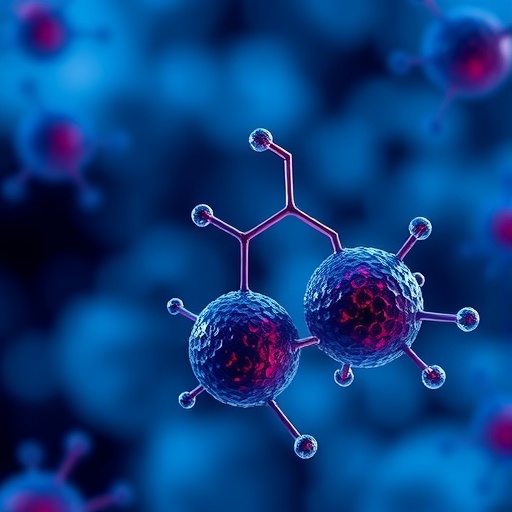In the ongoing battle against cancer, researchers have made significant strides in developing targeted therapies that can improve treatment outcomes while minimizing the adverse effects commonly associated with traditional chemotherapy. A groundbreaking study led by A. Prajapati and H. Patel focuses on a pivotal area of cancer biology: the p53-MDM2 pathway. Their innovative research employs novel triazole-oxazole hybrids, representing a promising new approach in the realm of fragment-based drug discovery aimed at next-generation cancer treatments.
The p53 protein, often referred to as the “guardian of the genome,” plays a critical role in preventing tumor formation and maintaining genomic stability. Mutations in the TP53 gene, which encodes the p53 protein, are among the most common alterations found in various cancers. This disruption allows malignant cells to evade apoptosis, proliferate uncontrollably, and present significant challenges in treatment. Meanwhile, MDM2, a crucial regulator of p53, binds to the p53 protein and induces its degradation, effectively neutralizing its tumor-suppressing functions. Therefore, reactivating p53 by inhibiting its interaction with MDM2 presents an attractive therapeutic strategy.
The researchers employed a fragment-based drug discovery approach, a strategy that has gained traction due to its ability to succeed where traditional high-throughput screening has faltered. This methodology involves identifying small chemical fragments that bind to the target protein and then optimizing them into larger, more effective drug candidates. This process is particularly useful in targeting protein-protein interactions, which are notoriously difficult to disrupt with conventional drug discovery techniques.
In their study, Prajapati and Patel embarked on synthesizing a series of triazole-oxazole hybrids, which were designed to inhibit the p53-MDM2 binding. Their hypothesis was that these unique compounds would selectively disrupt the interaction between p53 and MDM2, thereby restoring the functional role of p53 in tumor suppression. Through rigorous in vitro assays and structural biology techniques, they were able to evaluate the binding affinities of their synthesized compounds and confirm their efficacy.
The synthesis of triazole-oxazole hybrids relied on a strategic chemical framework that allowed for the introduction of various substituents, optimizing their binding properties and biological activity. The versatility of the triazole and oxazole moieties expands the potential for creating a diverse library of compounds, each with unique mechanisms of action targeting cancer therapy. The iterative nature of fragment-based drug discovery facilitated the refinement of these compounds, leading to highly potent candidates that showed promise in initial pharmacological evaluations.
Results from the study illustrate that several of their synthesized triazole-oxazole hybrids demonstrated a remarkable ability to displace MDM2 from its interaction with p53, effectively increasing the levels of active p53 in cancer cell lines. This promising finding opens up new avenues for therapeutic intervention in cancers characterized by MDM2 overexpression, which is known to be the case in a significant subset of tumors, including sarcomas and certain leukemias.
Importantly, the researchers also assessed the cytotoxic effects of their lead candidates on various cancer cell lines. They discovered that these compounds selectively induced apoptosis in tumor cells while sparing normal cells, a crucial differentiation for drug safety and patient quality of life. The therapeutic index of these novel hybrids suggests that they could be developed into effective drugs with fewer side effects than traditional chemotherapeutics that indiscriminately target rapidly dividing cells.
Given the complexity of cancer as a disease characterized by genetic and phenotypic heterogeneity, the development of targeted therapies based on specific molecular aberrations is essential. Next-generation therapies such as those developed by Prajapati and Patel align with the modern paradigm of personalized medicine, wherein treatments are tailored to the individual genetic profiles of patients’ tumors. This innovative study adds to a growing body of literature that highlights the importance of the p53-MDM2 axis as a critical target for therapeutic intervention.
Furthermore, their work underscores the potential of fragment-based drug discovery not only in cancer but across various therapeutic areas. The ability to identify and optimize small, low-molecular-weight compounds provides a framework for accelerating the drug development process, potentially bringing life-saving therapies to patients more efficiently. As researchers continue to delve deeper into the complexities of cancer biology, studies like this one will undoubtedly pave the way for novel treatment strategies that improve outcomes for patients worldwide.
The implications of this research are vast, and as more data becomes available from clinical studies utilizing these compounds, the scientific community will be poised to understand better the unique characteristics of these novel hybrids. Each advance brings us one step closer to transforming cancer from a lethal disease into a manageable chronic condition. As the horizon of cancer therapy expands, Prajapati and Patel’s findings are sure to stir hope for patients and healthcare providers alike.
In summary, the innovative approach of targeting the p53-MDM2 pathway with triazole-oxazole hybrids signifies a crucial advancement in cancer research. The meticulous work outlined in this study exemplifies the potential of fragment-based drug discovery to yield effective and safer cancer therapies. As research continues to elucidate the complexities of tumor biology, these efforts are critical in shaping the next generation of cancer treatments aimed at improving patient outcomes and navigating the multifaceted challenges of this dreaded disease.
Subject of Research: Development of triazole-oxazole hybrids targeting the p53-MDM2 pathway for cancer therapy.
Article Title: Targeting p53–MDM2 pathway with novel triazole–oxazole hybrids: a fragment-based drug discovery approach for next-generation cancer therapies.
Article References:
Prajapati, A., Patel, H. Targeting p53–MDM2 pathway with novel triazole–oxazole hybrids: a fragment-based drug discovery approach for next-generation cancer therapies.
Mol Divers (2025). https://doi.org/10.1007/s11030-025-11364-7
Image Credits: AI Generated
DOI: 10.1007/s11030-025-11364-7
Keywords: cancer therapy, p53, MDM2, triazole-oxazole hybrids, fragment-based drug discovery.
Tags: cancer treatment innovationsfragment-based drug discoveryMDM2 regulation of p53minimizing chemotherapy side effectsnext-generation cancer treatmentsnovel cancer drug developmentp53 protein functionp53-MDM2 pathway inhibitorstargeted cancer therapiesTP53 gene mutationstriazole-oxazole hybridstumor suppressor reactivation





